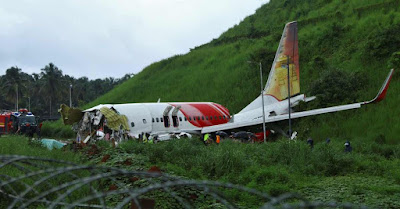The total number of aircraft accidents decreased from 52 in 2019 to 38 in 2020, and the fatal accidents declined from 8 in 2019 to 5 in 2020, revealed the 2020 Safety Report released by Montreal-based International Air Transport Association (IATA), which represents over 280 commercial airlines worldwide.
The eight fatal accidents in 2019 had
claimed 240 lives. In 2020, three accidents were reported with jet airliners
and two with turboprops killing 132 people, the report said. In May 2020, Pakistan
International Airlines flight PK8303 from Lahore to Karachi had crashed shortly
before it could land at Karachi airport killing 97 out of the 99 people on
board including 8 crew members. Only two passengers, a bank executive, and a
mechanical engineer on board the Airbus A320 survived the crash.
The second biggest accident was reported in India. In August 2020, an Air India Express Boeing 737 from Dubai to Kozhikode skidded off the runway after landing on the table top runway, killing 21 people including both the pilots.
“On 8 January 2020, the world experienced a
shocking tragedy with the shooting down of Ukrainian International Airlines
Flight 752, minutes after takeoff from Tehran Imam Khomeini International
Airport. All 176 people on board perished. Similar to MH17, this is another
tragic example of what can go wrong around conflict zones. The incident is
considered an unlawful act and is, therefore, included in aviation security
statistics and not in this report,” the executive summary of the report said.
The accident categories in 2020 listed in order
of the number of fatalities were:
• In-flight Damage (2) with 104 fatalities
• Runway/Taxiway Excursion (2) with 24
fatalities
• Controlled Flight into Terrain (1) with 4
fatalities
The top five accident categories in 2020 listed
by the frequency of accidents (including the ones with fatalities) were:
• Runway/Taxiway Excursion (9)
• Hard Landing (7)\
• Gear-up Landing/Gear Collapse (6)
• In-flight Damage (5)
• Ground Damage (3)
With COVID-19 pandemic severely impacting
the normal commercial flight operations, the accident rate has shown an
increase. The accident rate increased from 1.11 accidents per million flights in
2019 to 1.71 accidents per million flights in the COVID-19 pandemic year though
total flight operations in 2020 reduced by 53 per cent, the report said.
“Flying
is safe, although the industry did take a step back on performance in 2020. The
severe reduction in flight numbers magnified the impact of each accident when
we calculate rates. But numbers don’t lie, and we will not allow this to become
a trend. We will have even sharper focus on safety during this period of
reduced operations and as flight schedules are rebuilt when the world
reopens,” said Alexandre de Juniac, IATA’s Director General and CEO.
For the first time in more than 15
years there were no Loss of Control Inflight (LOC-I) accidents, which have
accounted for the largest share of fatalities since 2016. “The lack of any
such events in 2020 was a positive development. Nevertheless, based on the
initial reports from the investigation into the tragic loss of Sriwijaya Air SJ
182 early in 2021, we must continue to learn and improve,” said de Juniac.





